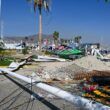Climbing out of the hole
By Chuenchom Sangarasri Greacen, November 26, 2013
In the developing world, the costs and benefits of energy production are rarely shared equitably. A case in point is Thailand’s Pak Mun Dam. This project produces only enough electricity to power one large shopping mall in Bangkok, and the World Commission on Dams has judged it economically unjustifiable. But constructing the dam displaced 1,700 families and, by disrupting fisheries, affected the livelihoods of 6,200 households.
It is encouraging that middle classes in developing countries are expressing increased environmental consciousness, but if their environmental consciousness remains superficial, the result is only a not-in-my-backyard attitude. This can produce "green apartheid," with well-to-do areas benefitting from dirty energy projects located far away. Thailand, for instance—a prosperous nation compared to some of its neighbors—increasingly derives its electricity from destructive dams or polluting power plants located in Laos, Cambodia, and Myanmar (countries with lax environmental laws and enforcement mechanisms). For many Thais, the negative consequences of these facilities remain out of sight, out of mind.
All this makes it seem as if the consuming class benefits unfairly at the expense of the poor. But in Thailand, the reality is that energy investments are increasingly driven by the greed of corporations, not by the preferences of the Thai middle class. Because many of the government’s top energy planners sit on the boards of privatized energy companies, planning is distorted and unnecessary projects are churned out. A select few people profit from this corrupt combination of money and politics. Consumers are held captive, underwriting superfluous and destructive energy ventures. So it isn’t fair to characterize the middle class’s environmental concerns as hypocritical—just as it isn’t fair to dismiss as "antidevelopment" the environmental concerns of the poor.
Uneven distribution. The flow of energy from poor areas to rich areas is common—within countries, between countries, and between the developing and developed worlds. But paradoxically, the countries from which energy resources are exported are often energy-poor themselves. In Myanmar, for example, only 26 percent of the population has access to electricity (and even this is intermittent). But according to a 2012 report by the Asian Development Bank, more than half the country’s energy supply goes to export.
Globally, decades of economic development have generated a lot of energy and a lot of profit, but neither is distributed evenly. Nearly 1.3 billion people around the world lack electricity access, while 46 percent of the world’s wealth is concentrated among the richest 1 percent of people. Energy projects, far from granting poor people access to modern energy services, often leave them displaced, with their natural environments polluted or degraded.
Poverty exists not because the world has too little wealth but because the global economic system is unjust. As Mohandas Gandhi put it, "The world has enough for everyone’s needs, but not everyone’s greed." If one were to visualize the global economy in three dimensions, it would look roughly like a pyramid, but with a high, pointy tip and a wide, spreading base. The top 1 percent occupy the upper reaches, and the poor are massed at the bottom. This system works as long as people at the bottom can be soothed by promises of future comfort, convenience, mobility, and novelty. But at some point—because of unbearable inequality, resource scarcity, climate change, or an accumulation of other environmental woes—the globalization party will end.
Yes, the world must do a better job of meeting the basic needs of people at the bottom of the economic pyramid. But in a finite world, these needs cannot be met by continuing on a path of endless economic growth and ever-higher demand for energy. In fact, fossil fuel consumption must decline precipitously—in developed and developing nations alike—if humanity is to avoid climate catastrophe.
But breaking away from fossil fuels will be tremendously difficult. These fuels, in addition to providing energy, have become essential inputs in everything from synthetic fertilizers to plastics. Fossil fuels are engines of capital generation and accumulation. They are time savers, labor savers, conveyors of international trade, yardsticks of progress, supposed guarantors of national security, and addictive drugs disguised as providers of convenience and comfort. They have allowed production facilities to relocate anywhere in search of cheap labor. They have enabled the creation of mobile, dispensable work forces. They have made geography an abstraction, with resources anywhere now fair game for multinational corporations. They are the necessary precondition for accumulating capital on the basis of exploiting global labor and resources. Fossil fuels are so entrenched in the global economy that reducing dependence on them will require radical change.
Unfortunately, the solution to climate change cannot be as simple as switching to alternative forms of energy. Renewable energy sources and conservation technologies should be exploited to their maximum potential wherever doing so makes economic sense. But though some countries are embracing green energy, few so far have made a meaningful dent in their carbon dioxide emissions. And often green energy is given only lip service—or is met with outright resistance. Simply put, green energy does not provide a silver bullet for the world’s climate problems. Nuclear projects, meanwhile, are too expensive, present too many environmental and proliferation risks, and take too long to build. Nuclear energy should be off the table.
So how does the world lift itself out of the fossil fuel hole it has dug? By building a global economy based on meeting people’s basic needs, including those of future generations. Governments, prodded and held accountable by publics and nongovernmental organizations, can engage in a number of steps that would help create such an economy.
Immediately, governments should abandon policies that further entrench the fossil fuel economy. No new coal- or gas-fired power plants should be built. Plans for superhighways should be abandoned. Auctioning of petroleum concessions should cease. Subsidies and tax privileges should be withdrawn from any energy-intensive industry that primarily serves export markets. Support should also be withdrawn for energy- and chemical-intensive agriculture.
Next, taxes should be imposed or increased on carbon emissions—and also on capital gains, speculative financial flows, and inheritances. Taxes on labor, meanwhile, should be reduced. Overall tax revenues would increase, and these funds should be invested in green energy, health, education, community empowerment, and reorienting economic infrastructures toward self-sufficiency, sustainability, and meeting basic needs.
A long-term goal of all this would be economic relocalization. Investment would be locally directed and consumption would be locally sourced. Natural resources would fall under local stewardship. Profits would come in the form of improved health, stronger communities, and a cleaner environment. People would work not so much to amass money as to address real needs—their own needs, other people’s, and those of everyone’s children and grandchildren.
Topics: Climate Change
Share: [addthis tool="addthis_inline_share_toolbox"]














